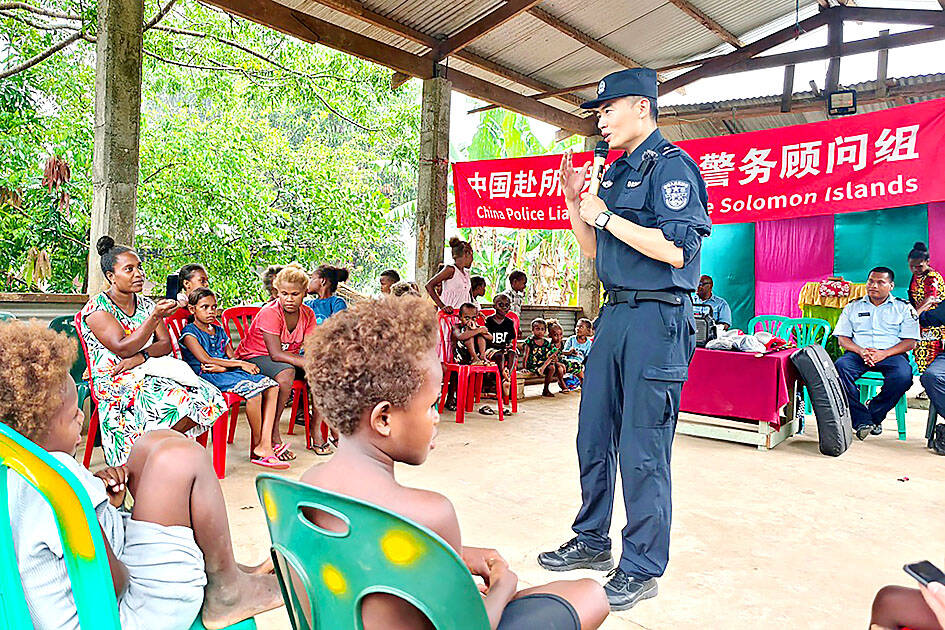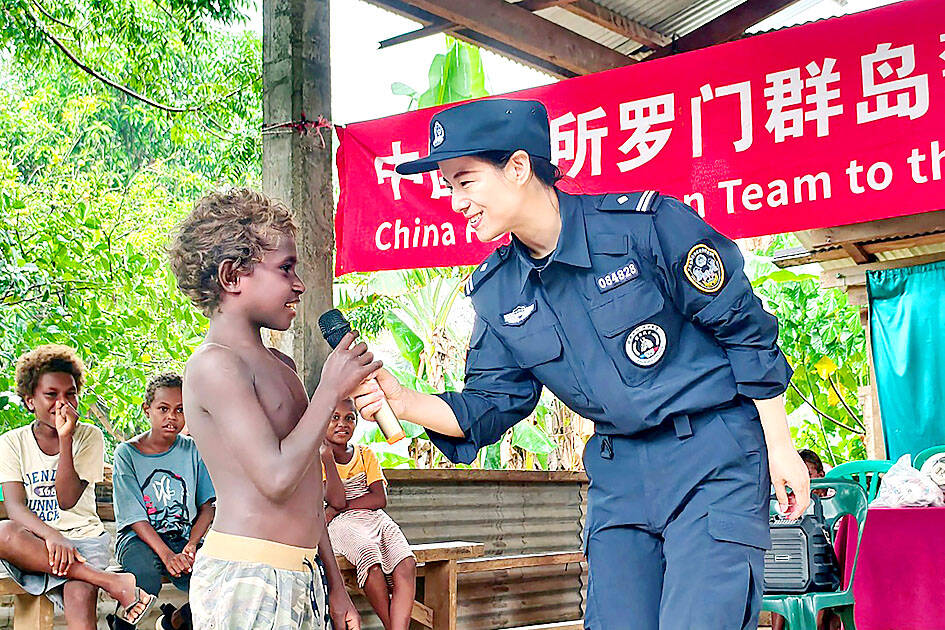China has exported its village surveillance model to the Solomon Islands in the Pacific, where Chinese police are piloting fingerprint and data collection to curb social unrest, officials and locals said.
China’s “Fengqiao” monitoring model — started under Mao Zedong (毛澤東) in the 1960s to help communities mobilize against reactionary “class enemies” — has been reinvigorated by Chinese President Xi Jinping (習近平) to ensure stability in local communities.
In the Solomon Islands, a security partner of Beijing, Chinese police have visited several villages this year promoting the Fengqiao concept, familiarizing children with surveillance drones by playing games, pictures posted to social media by Solomon Islands police show.

Photo: AFP
A grid system operates across Chinese villages, with each grid manager responsible for “monitoring blocks of households,” said Ben Hillman, Director of the Australian Centre on China in the World at the Australian National University.
It was an “ideal mode of governance” for the Chinese Communist Party because “people mobilize in support of the party’s agenda and monitor each other so that social conflicts can be nipped in the bud before they escalate,” Hillman said.
“It is unusual to see the model promoted outside of China because its operation depends on particular social and political institutions,” he added.

Photo: AFP
PILOT PROJECT
Andrew Nihopara, a community leader in the Solomon Islands, said that the village of Fighter 1 on the fringe of the capital, Honiara, had begun working with the Chinese police on a Fengqiao pilot, but declined to comment further.
The Royal Solomon Islands Police Force said in a statement this month that the Fengqiao model of “grassroots governance” in Fighter 1 would collect population data to improve security.
Chinese police had introduced residents to population management, household registration, community mapping and the collection of fingerprints and palm prints, the statement said.
“The Fighter One community is the first attempt, and it will be expanded to a larger area across the country in the future,” the statement quoted Chinese police inspector Lin Jiamu (林嘉木) as saying, adding that the initiative would enhance safety.
The move has stirred human rights concerns.
“It is an infringement on individual rights that are protected by our Constitution and should have come through parliament, through our laws,” opposition party politician Peter Kenilorea said in a telephone interview.
The office of Solomon Islands Prime Minister Jeremiah Manele referred questions to the police, who did not respond to a request for comment.
The Chinese Ministry of Public Security gave a seminar in February about the Fengqiao Experience in the Solomon Islands, drawing parallels between China’s villages and the island’s social structure, a Chinese embassy post on the WeChat messaging app showed.
‘DISREGARDS CULTURE’
Solomon Islands Ministry of Traditional Governance, Peace and Ecclesiastical Affairs Deputy Director Clifton Aumae said that he did not think Fengqiao would be accepted by traditional villages.
“This system disregards the culture that we have. I don’t think it will sit well with traditional communities in the Solomon Islands, where the chief is always at the center and is responsible for order,” he said.
Aumae said his ministry instead wants to restore the power of village chiefs under the law to deal with youth anti-social behavior.
‘A RISE IN LAWLESSNESS’
A resident near Fighter 1, who is familiar with the Fengqiao trial, but did not want to be named, said that the community was multi-ethnic and there had been “a rapid deterioration in social order and a rise in lawlessness.”
In the urban fringe, communities with residents drawn from many provinces were resisting traditional systems, he said.
“This might be a stepping stone toward creating order as well as keeping data, which is one thing that is lacking,” the resident said.
Kenilorea said he was concerned it was a step toward an authoritarian system. “There are better ways to manage communities that are impoverished or struggling,” he said.
Chinese police had also promoted Fengqiao when visiting 16 villages in Malaita, the largest Solomon Islands province with a history of anti-China protests, another police statement on social media showed.
China struck a security pact with the Solomon Islands in 2022 after anti-government riots in 2021. The protests were fueled in part by Malaita politicians opposing the Solomon Islands’ switching diplomatic ties from Taiwan to Beijing.

Yemen’s separatist leader has vowed to keep working for an independent state in the country’s south, in his first social media post since he disappeared earlier this month after his group briefly seized swathes of territory. Aidarous al-Zubaidi’s United Arab Emirates (UAE)-backed Southern Transitional Council (STC) forces last month captured two Yemeni provinces in an offensive that was rolled back by Saudi strikes and Riyadh’s allied forces on the ground. Al-Zubaidi then disappeared after he failed to board a flight to Riyadh for talks earlier this month, with Saudi Arabia accusing him of fleeing to Abu Dhabi, while supporters insisted he was

The Chinese Embassy in Manila yesterday said it has filed a diplomatic protest against a Philippine Coast Guard spokesman over a social media post that included cartoonish images of Chinese President Xi Jinping (習近平). Philippine Coast Guard spokesman Jay Tarriela and an embassy official had been trading barbs since last week over issues concerning the disputed South China Sea. The crucial waterway, which Beijing claims historic rights to despite an international ruling that its assertion has no legal basis, has been the site of repeated clashes between Chinese and Philippine vessels. Tarriela’s Facebook post on Wednesday included a photo of him giving a

‘MOBILIZED’: While protesters countered ICE agents, Minnesota Governor Tim Walz activated the state’s National Guard to ‘support the rights of Minnesotans’ to assemble Hundreds of counterprotesters drowned out a far-right activist’s attempt to hold a small rally in support of US President Donald Trump’s latest immigration crackdown in Minneapolis, Minnesota, on Saturday, as the governor’s office announced that National Guard troops were mobilized and ready to assist law enforcement, although not yet deployed to city streets. There have been protests every day since the US Department of Homeland Security (DHS) ramped up immigration enforcement in the Twin Cities of Minneapolis and Saint Paul by bringing in more than 2,000 federal officers. Conservative influencer Jake Lang organized an anti-Islam, anti-Somali and pro-US Immigration and Customs Enforcement

NASA on Saturday rolled out its towering Space Launch System (SLS) rocket and Orion spacecraft as it began preparations for its first crewed mission to the Moon in more than 50 years. The maneuver, which takes up to 12 hours, would allow the US space agency to begin a string of tests for the Artemis 2 mission, which could blast off as early as Feb. 6. The immense orange and white SLS rocket, and the Orion vessel were slowly wheeled out of the Vehicle Assembly Building at the Kennedy Space Center in Florida, and painstakingly moved 6.5km to Launch Pad 39B. If the